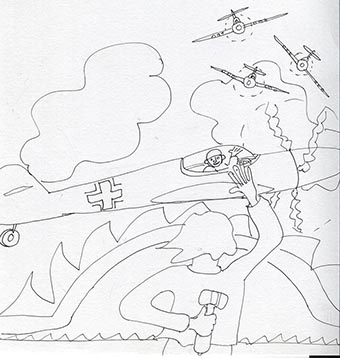In times of conflict the enemy, through cultural propaganda, quickly become demonised and are presented as creatures from the pit of hell. Children however, are liable to take these representations as real and have no idea that the enemy also has human characteristics and may well be similar to themselves.
Messerschmitt 109
The boy is playing in his back garden. He has constructed a catapult with strips of bicycle inner-tube bound to a heavy forked twig. He is firing small stones down the garden at anything which looks in his fantasy world like a German.
His aim is devastating and a tin can or two set up on sticks soon receive their come-uppance, and he has the enemy on the run.
The windows of the house adjoining are being cleaned by the lady-next door. Her husband is in a Japanese prisoner of war camp and has not been heard from for an ominously long time. Opening her windows wide she busies herself with a cloth and leans far out, searching closely across the sheen of the glass for minor blemishes and she does not notice the three black specks speeding in a line through the distant sky; but they have the boy’s attention.
‘Probably Hurricanes,’ he thinks, in spite of their dark colour, for what enemy would challenge the daylight skies on this pleasant sunny day? But the engine note is odd and does not sound like Spitfires. He watches the black specks with interest, always eager to spot new types, and he had observed the Spitfires of 222 squadron from the nearby airfield go through their marks like a connoisseur.
The specks bank and seem to be coming around again and this time their trajectory will sweep then in a straight line clear along his street and what’s more, they have chosen to follow the row in which stands his own house. Barely clearing the rooftops the planes begin their run and he watches as they rapidly approach. He has never seen planes so low and prepares to block his ears to their unmuffled roar, but no sooner have his hands closed about his ears than they drop in shock to his sides. Now that the planes are almost upon him he can clearly see the crosses against the wing’s black underside.
‘Blimey!’ says the woman-next-door, and slams her window shut with a bang.
Too late to run for the shelter or into the house, he is rooted to the spot as the leading plane banks slightly and dips its nearside wing low. One flip of the tail and he could be machine-gunned to death. As the plane tilts onto its side the pilot, goggles up and canopy pulled back, looks down into the back garden and straight into the eyes of the boy who transfixed, gazes in mindless wonder and fear upwards. The planes are not moving fast, and there comes a brief and utterly timeless instant when the two look straight into each other’s eyes. The boy suppresses an urge to wave; he knows this is definitely taboo, but the impact of that moment of intimate contact has sent his mind reeling.
‘But he was just an ordinary man,’ he thinks, and is stunned by this revelation. ‘He was just like us.’
He cannot reconcile his interior image of Germans with the glimpse of the pilot’s human face. Were he to pass the man in the street he would not give him a second glance, and his reality is crashing. Where were the fangs that he had seen in the newspaper drawings and comics, the teeth serrated like saw blades and the jaws slavering with blood? Where the fearsome snarl and bloodshot piggish eyes? There had been no more than a passing curiosity in the pilot’s eye and by the expression on his face could have been pruning his roses.
The two other planes pass without incident, rapidly diminishing into black specks and now, too late to catch these daredevils, 222 is revving up its engines at the airfield, and within a minute a half-dozen Spitfires rise smoothly above the rooftops. They take off in pursuit of the intruders and the boy hopes they will not catch the Messerschmitts.
Now he wants to run into the house to announce this startling news to his mother. ‘They’re just like us!’ he wants to shout, but he suspects she will not believe him. Her attitude to the German demons is implacable; only he knows this secret knowledge which must remain unspoken and he dare say no word of it. But he hopes the German got home safely. He feels an immense affinity with the pilot and thinks of him as a friend.
Somewhere, deep inside, he wishes he had waved.
Dave Tomlin
Art Nick Victor

